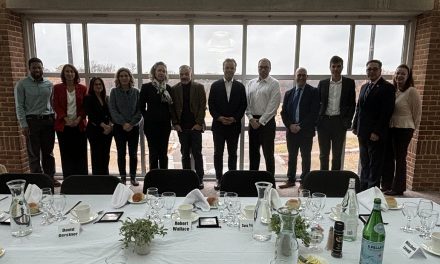This fall semester, the College of Staten Island has launched a new international program—Exchange Ambassadors, where CSI students attend classes at institutions of higher learning abroad and students from those same institutions come to CSI and take courses here. Participating students pay tuition fees that they would normally pay at their home institutions, thereby reducing the cost of studying abroad.
At present, there are five students from abroad who are participating in the program. They include Sho Matsufuji, Seinan Gakuin University, Japan; Etienne Boutaine, IPAG, France; Michael Mo, City University of Hong Kong; and Andrea Wilson and Matthew Cook, the Dublin Institute of Technology.
Matsufuji, a junior who is studying economics, enjoys the program, so far. “I am happy to be an Exchange Ambassador because I can talk with CSI students. In addition, I can learn about American culture.”
Boutaine, a business major who is also a junior, notes, “I feel very proud and happy to be an Exchange Ambassador here at CSI, because my school picked me from among 20 people and my professors thought I was the best one to represent my school abroad…It’s also a great opportunity for me because today companies are looking for people with ‘international skills’.”
Mo, a sophomore majoring in political science, adds that he is enjoying his visit to New York City because he is learning about the current “sociopolitical environment.” He also reports that he is looking forward to following the November presidential elections, here in the U.S.
Ann Helm, Director of the College’s Center for International Service, which oversees the program, explains, “We’ve sent a lot of students on study abroad programs at international partner institutions in other parts of the world but we haven’t had a reciprocal exchange program and that’s what this is. Whereas we have international students coming to us for degrees, the exchange students actually come as representatives of their institutions and these institutions are our partners around the world.”
According to Helm, the Exchange Ambassadors engage the CSI and Staten Island communities “in a very deliberate way. Their Exchange Ambassador time is only one semester or one year, so we want to take advantage of their presence to really help them meet as many people as possible, represent their institution and their culture in as many ways as possible, so that everyone gains.” Students who are visiting CSI will represent their home institutions by “giving ‘World on Wednesday’ presentations, participating in all forms of student activities, representing the Exchange Ambassadors program to local civic organizations, and being invited to special gatherings in the community.”
In addition, these Ambassadors serve as representatives of both their home institutions and CSI. “They go back as ambassadors from CSI and spread the word about what CSI has to offer and the opportunities available here among their fellow students. While they are here, they represent their own institution and the exchange program. If it works the way it’s designed, then we have a constant flow of students back and forth between two institutions—CSI and another institution—and we strengthen our relationship with that institution and our opportunity to do all sorts of collaborative projects. This is an exchange of people, but it’s also linked to an academic program… and each Ambassador has an advisor in that academic department. That person also arranges for the student to meet with people, perhaps in class presentations, and that person serves as a mentor while the student is here,” according to Helm. Another aspect of the academic connection is an exchange of faculty, as well as students.
As for the selection process, Helm says that “these students are chosen for their ability to represent, so it is a selective program. As the program becomes better known it will become more competitive. We want to have students who have the right idea about their role in studying at the partner institutions. We still have lots and lots of opportunities for students to study abroad all over the world, but these reciprocal programs are almost like a scholarship.”
Also, “because it is a selective program,” Helm continues, “it’s also a great for résumé building. They can demonstrate that during their term abroad as an Exchange Ambassador, they really engaged with the community and really learned the culture of the local community of the academic institution. These skills and insights will be part of who they present to a graduate school or a future employer.”
At present, the Exchange Ambassadors program is working with a select number of institutions, but Helm expects that number to grow. For example, Jonathan Peters, Associate Professor of Finance at CSI has just concluded an exchange agreement with the University of Canberra in Australia, announcing the news at two student seminars last week. Peters has already visited Canberra in a faculty exchange, and Cameron Gordon, a member of the University of Canberra’s faculty, will join CSI’s faculty in spring 2009 as the College’s first Senator John J. Marchi Visiting Scholar in Public Affairs. In addition, next year the student exchange will be initiated with two CSI students exchanging with two Australian students.
For more information about CSI’s Exchange Ambassador Program and study abroad opportunities, contact Deborah Stengle, Study Abroad Advisor, at the Center for International Service 718.982.2100.
















